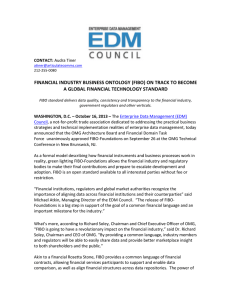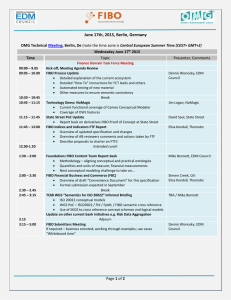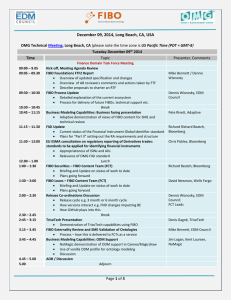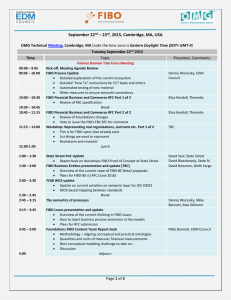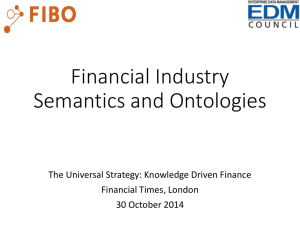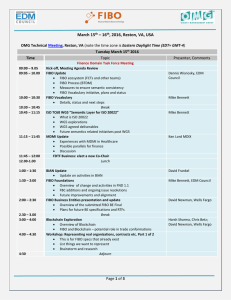The Financial Industry Business Ontology Demystifying Financial Industry Semantics
advertisement
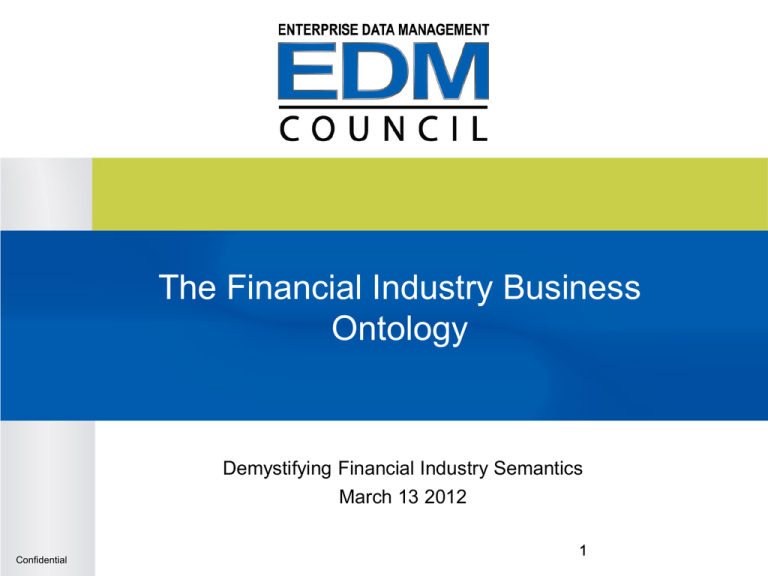
The Financial Industry Business Ontology Demystifying Financial Industry Semantics March 13 2012 Confidential 1 Overview • Background to Financial Industry Semantics • EDM Council Semantics Repository history • Financial Industry Business Ontology – Collaboration with the Object Management Group • What you can expect • Training and certification through the OMG Confidential The View From My Place Some banks Confidential The View From My Place Some banks Some IT Firms Confidential Data Governance • A Bank is in essence an IT Company – Software manufacturing – Data production, consumption, – Information supply chain • So how do we manage the business view of data? – Language interface business to IT – Conceptual model Confidential Copyright © 2010 EDM Council Inc. 5 Managing Semantics Confidential Conceptual Model for Data Conceptual Model (Semantics) Realise Logical Model (Design) Implement Physical Model (Implementation specific) Confidential Copyright © 2010 EDM Council Inc. 7 Conceptual Model Requirements • Must be owned and validated by business – Manage the “Language interface” between tech and business subject matter experts – Everything should be in English • No techie terms and casing like “objectProperty” – Everything should be reviewable • Spreadsheets • dialect-free diagrams Confidential Copyright © 2010 EDM Council Inc. 8 The Semantic Web • Web Ontology Language – Based on Subject-Verb-Object “Triples” – Widely used • Protégé tool • Experiment: Ingest a logical data model into OWL – Result: a logical data model in OWL • Syntax is not semantics! Confidential Example “Thing”: Equity • Real world definition of Equity: "An equity is a financial instrument setting out a number of terms which define rights and benefits to the holder in relation to their holding a portion of the equity within the issuing company". Confidential 23 June 2010 10 What is an Equity? Or to put it another way… Financial Instrument Equity Is a kind of Equity security In relation to Instrument Terms Has rights defined in Confidential 23 June 2010 11 Lessons Learned • Putting something into RDF/OWL does not make it meaningful – Only you can do that • So, what is a meaningful model – 1. Formal relationship between model and subject matter: • “Everything is a Thing” – 2. Formal notation grounded in common logic – 3. Abstraction of kinds of thing into their simplest possible building blocks • Contracts, Parties, Legal Entities etc. Confidential What we want • Business meanings • In business language • For business people Confidential What we want • Business meanings – Not data dictionary • In business language – Not a design • For business people – No funny symbols and things – No language to learn – Just the facts – Boxes and lines – something like this… Confidential Sample screenshot 2: Different types of Thing Confidential The EDM Council Theory of Meaning – in English • The model consists of: – Things • A Thing is a set theory construct • Arranged in a hierarchy called a “Taxonomy” – Like taxonomy of species – Facts • Simple facts (names, dates etc.) – e.g. “Issue Date” is a date • Relationship Facts (relate one thing to another thing) – e.g. “Share confers Voting Rights” – Things so referenced are also in taxonomic hierarchies – Other set theory concepts • Disjoints, Unions Confidential Theory of Meaning – in English • Taxonomy: Like Taxonomy of Species – Animal v Plant – Vertebrate v invertebrate – Mammals, fish etc. • Each thing is defined by what facts distinguish it • For each new thing: – What sort of thing is it? – What facts distinguish it from other things? • If it walks like a duck, swims like a duck and quacks like a duck, it belongs to the set of all things that are a duck Confidential Semantics Repository History • Created the model Framework – Early draft of an OMG standard for ontology rendition in mainstream tooling • Ontology Definition Metamodel (ODM) – Configured tool to not show any design notation • No dots and whistles • Reverse engineered terms from industry standards – i.e. “What does this term mean” – Definitions reframed to describe real things not data elements or “Fields” • Subjected to business subject matter expert reviews Confidential Semantics Repository History • Traded Securities – Series of SME Reviews – Now in Beta • Market Data and Analytics – Series of SME Reviews – Time component to be realigned with OMG Date/Time vocabulary Confidential Debt Securities Deep Dive • MBS Proof of Concept • Extension of structured finance terms – MBS, ABS, CDO etc. • Analyzed terms needed for systemic risk – Extensive new terms which were about loans • Loans SME Reviews • To do: formal alignment with MISMO Confidential Other SME Reviews • OTC Derivatives – Transaction Semantics – FpML Reference • Corporate Actions – Defined the concepts in SWIFT MT Messages – Process notation required to complete • Business Entities – Scope for LEI Confidential Global Terms • Rationale: – Everything is a specialization of some more general term • Legal, accounting, events, transaction semantics – Facts about instruments are stated in terms of other things • Countries, formulae etc. • Want to derive from and align with the best ontologies for these area • Disposed under a common framework • FIBO models are extensively partitioned • Shared Semantics: – Align with standard ontologies where these exist – Leverage OMG standards e.g. Date Time Vocabulary • Work with academia and standards (ongoing) – Transaction Semantics: REA, XBRL-GL Confidential OMG Collaboration • Formal collaborative relationship between EDM Council and OMG • Rationale: – Our members want to refer to the ontology but rightly expect to see a standards governance mechanism – Also we had used early drafts of OMG standard for representing ontology in CASE tools • Additional benefits – Availability of content in “Semantic web” format (RDF/OWL) – Tool-neutral machine readable serialization – Available in central metadata repository Confidential OMG Collaboration To Date • Realigned the underlying framework in terms of the latest iteration of those OMG standards (ODM, support for OWL2) • Formalize the “Shared Semantics” treatments • Metadata improvements – Make all current model metadata available in RDF/OWL • Provenance etc. • Annotation metadata using OMG recommendations – Identify and implement additional metadata • Divide the Semantics Repository content into separate FIBO standards – These are also further modularized so people can use the bits they need Confidential Semantics Repository Mind Map User Commitments Original XBRL Content Boxes & Lines SME Reviews Industry Standards XLS ISO 20022 FpML MDDL Semantics Repository creates Archetypes Theory of meaning enhancements for readability SemWeb OWL constructs Confidential Tweaks for Tool support ODM EA UML Tool Financial Industry Business Ontology User Commitments Original XBRL Content Boxes & Lines SME Reviews Industry Standards XLS ISO 20022 FpML MDDL FIBO Archetypes Theory of meaning UML Tools Sub-set for readability SemWeb OWL constructs RDF/OWL ODM ODM v1.1 Confidential So what is FIBO • FIBO has these distinct aspects: – The Business Ontology – Presentation for Business Readability • Released in discrete ontologies by subject area – FIBO for Business Entities is currently under submission – Securities, Loans, Derivatives to follow – Corporate Actions, Transactions later • Leverage other OMG standards and shared semantics Confidential Future FIBO Improvements • Some FIBO releases will make additional use of OMG standards in process notation, business rules etc. – Corporate Actions – Transactions processing • Improvements in transactions semantics will inform work in OTC derivatives and securities transactions • Adoption of OMG Date/Time vocabulary will be used in refactoring time-sensitive terms (price, yield, analytics) • Future iterations to add vocabulary (lexical) support via SBVR • Metadata – will continue to add metadata – Full mappings to industry XML and UML standards – Cross reference to legislation and regulatory requirements Confidential FIBO Uses Conventional Tech MDR Repository Semantic Web FIBO XLS OWL Model Semantic Data Model Reasoners Logical Data Model Mapping Linked Data Semantic Query Physical Data Model Model Driven Development Confidential Copyright © 2010 EDM Council Inc. 29 FIBO Uses • As a common reference point – Mapping, integration – Replaces ad hoc spreadsheets with a formal project deliverable – Extend locally for concepts within the firm • Model Driven Development – Position as “Business conceptual model” – Manage the “language interface” between Business and IT • Semantic Technology applications – Implemented across conventional data stores – New application infrastructures (Triple stores) Confidential FIBO Semantic Technology Applications • Model one get one free – Full and formal representation of the business facts as a common language across the enterprise – Rendition of this in Semantic Web format (OWL) opens the way to semantic technology applications • Formal reasoning across subject matter • Automatic classification of product types • Querying across subject matter • Business Conceptual ontology (FIBO) transformed into “Operational Ontology” Confidential FIBO and Regulatory Reform • Identification, classification • What regulators can do with semantic tech processing – Automatic classification – Reasoning – detect concentrations, exposures across business groups • Reporting and Semantics – No changes to the message formats • e.g. FpML for derivatives trade confirmations – Data which is aligned with a common semantic model from end to end – Some minor changes in reporting would potentially improve regulatory processing capabilities • The next level: institutional and system semantics Confidential FIBO Roadmap (projected) Q1, 2012 Q3, 2012 Q2, 2012 Vote Q4, 2012 Q1, 2013 Approve FIBO RFC1 FIBO RFC1 re Usage feedback Business Entity FIBO Reference Data Securities FIBO Reference Data Derivatives Funds BE Terms Business En Vote Approve Vote Approve FIBO Reference Data Funds MISMO Alignment FIBO LOANS DTV Alignment Vote Approve FIBO Date Dependent Market Date Ontology Process FIBO Process SMER content reviews Transactions Vote Vote FIBO Process Corporate Actions Approve FIBO Business Vocabulary (SBVR); business applications of FIBO document Transaction Terms / FIX Semantics Business Critical Elements for Counterparty credit risk FDTF-EDMC Derivatives POC; MBS POC Confidential Contracts ontology Tax ontology Main Take-away Points • An ontology is not another sort of data model – It does not replace or displace messaging standards, database schemes or anything else – Common semantics is about the business view of what’s in data – Enables mature approach to technology management • Putting it in a SemWeb tool doesn’t make it meaningful – You do • Two ways to leverage FIBO – Common semantics – Semantic Technology applications • Regulators and the industry are paying attention! Confidential Certification at OMG Dr. Jon Siegel Vice President, Technology Transfer and Director, Certification Object Management Group siegel@omg.org +1 781-444-0404 9/27/06 Copyright © 2004-2011 Object Management Group Page 35 Proposed FIBO Certification • Practitioner Certification – An Important Piece of the FIBO “Ecosystem” • Currently in the earliest planning stages • OMG is an experienced certification provider – Certifying practitioners of UML, SysML/MBSE, BPMN/BPM, Realtime Systems Development • Our suggested program configuration, on the next slide: 9/27/06 Copyright © 2004-2011 Object Management Group Page 36 Possible Certification Structure • Two-exam structure fits market needs in the simplest way – Analyst level covers use with existing ontologies – the way most will use FIBO – Ontologist level adds ontology construction, plus advanced knowledge and skills. Analyst level is prerequisite. 9/27/06 Copyright © 2004-2011 Object Management Group Page 37 FIBO Certification Benefits • Many Benefits Follow: – Training Companies will produce and offer Courses, Books – Practitioners will study and certify – These additional practitioners support expanded use of FIBO • What’s Next for the Program: – Is the FIBO specification ready? – Fund exam development by pre-selling exam vouchers – Recruit experts to scope topical coverage and write exam questions – Perform psychometric validation, and publish on Pearson VUE’s secure facilities 9/27/06 Copyright © 2004-2011 Object Management Group Page 38 OMG’s Certification Programs • OCSMP – SysML and MBSE: – http://www.omg.org/ocsmp/ • OCEB – BPM, BPMN, and related topics: – http://www.omg.org/oceb/ • OCUP – UML Modeling Standard: – http://www.omg.org/ocup/ • OCRES – Real-time and Embedded Systems Standards: – http://www.omg.org/ocres/ 9/27/06 Copyright © 2004-2011 Object Management Group Page 39 Contact OMG • OMG’s Certification Specialist: Dr. Jon Siegel Vice President, Technology Transfer and Director, Certification Object Management Group siegel@omg.org +1 781-444-0404 9/27/06 Copyright © 2004-2011 Object Management Group Page 40
